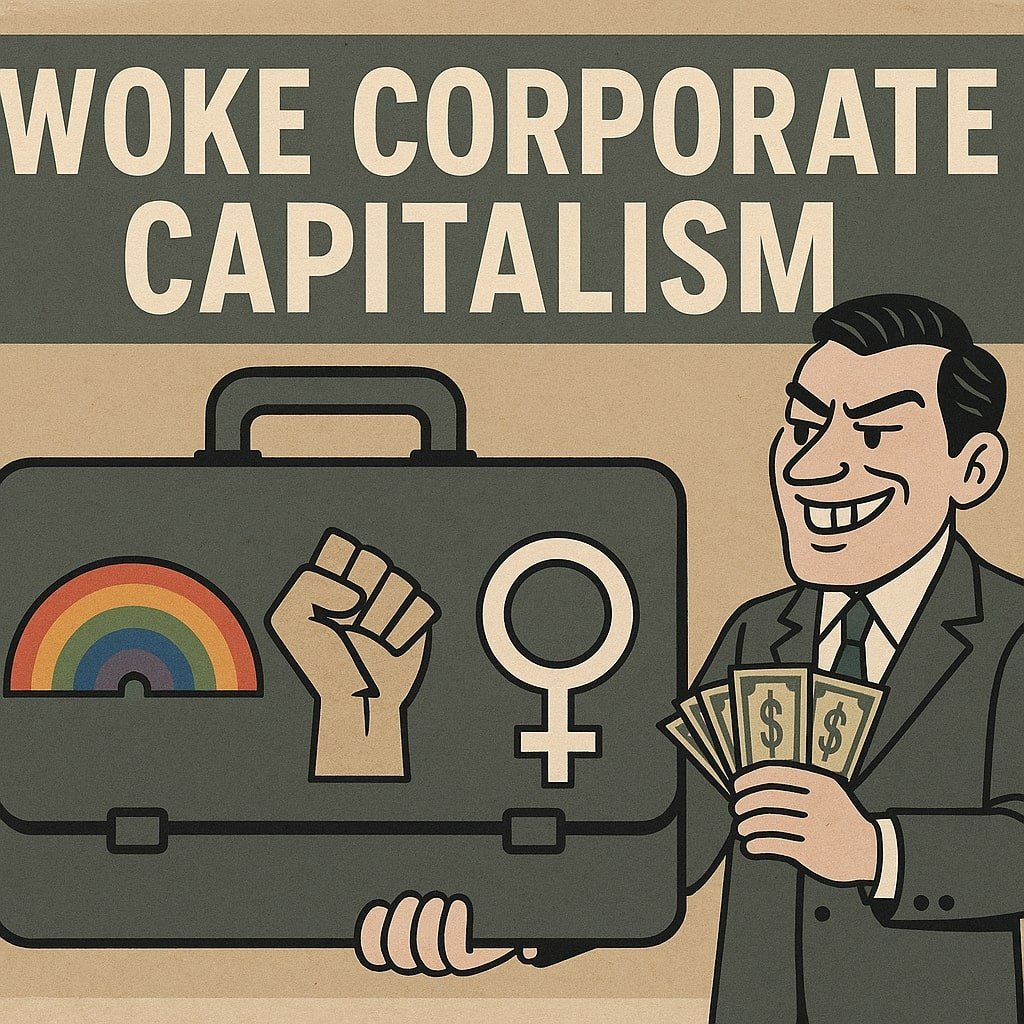Woke Capitalism Explained: When Morality Meets Marketing
From Profit to Propaganda
Corporations used to chase profit and skip the preaching. At least that was honest.
Now they wrap themselves in rainbow logos, hashtag campaigns, and endless DEI pledges. The new game is woke capitalism: where morality is marketing, outrage is advertising, and “solidarity” is a sales tactic.
The promise is progress. The product is branding.
Table of contents
What Is Woke Capitalism?
Woke capitalism is when companies adopt social justice causes as part of their brand identity. It looks like activism, but it’s really advertising.
- A soda company releases a “diversity” campaign.
- An oil giant tweets about Pride Month while lobbying against climate rules.
- A tech firm pledges inclusion while laying off thousands.
It’s not about values. It’s about optics.
Buzzwords of Woke Capitalism
The vocabulary is polished for maximum feel-good:
- “Solidarity” – tweeting slogans instead of changing policy.
- “Representation” – diverse ads covering exploitative supply chains.
- “Impact” – a 1% charity partnership after record profits.
- “Sustainability” – more products made of “recycled plastic,” still destined for landfill.
The words sell a story. The reality doesn’t match.
How Woke Capitalism Shows Up in Practice
- Advertising – glossy campaigns with every demographic box ticked.
- Branding – rainbow logos in June, mental health hashtags in October.
- Workplace – DEI trainings while exploiting cheap overseas labour.
- Politics – lobbying against reforms while sponsoring activist causes.
It’s progress packaged for profit.
Why Institutions Promote It
Because it works.
- Corporations sell products by aligning with trending causes.
- Marketing firms reinvent morality as a business model.
- Politicians outsource activism to brands while avoiding real reform.
- NGOs partner with companies for PR-friendly funding.
Everyone gets paid — except the people the causes were meant to help.
The Consequences
- Illusion of progress. Causes reduced to hashtags and ad campaigns.
- Consumer manipulation. Outrage and guilt turned into marketing tools.
- Cynicism. Ordinary people see through the hypocrisy but feel powerless.
- Distraction. Real injustices stay unresolved while we argue over coffee cups.
The revolution will be monetised — and trademarked.
Why It Matters
Woke capitalism diverts energy from real reform into branding exercises. It offers identity politics instead of class politics, logos instead of justice.
It doesn’t democratise capitalism. It deodorises it.
From Profit to Propaganda
The genius of woke capitalism isn’t moral progress. It’s moral camouflage.
Behind the rainbow logos and tearful ads, the supply chains, labour practices, and boardroom priorities stay the same.
The real product isn’t soda, sneakers, or software. It’s you — buying the illusion of change.
FAQ
What is woke capitalism in simple terms?
It’s when corporations use social justice causes as branding to sell products and polish their image.
Why is woke capitalism controversial?
Because it turns activism into advertising, distracting from real injustices.
What are examples of woke capitalism?
Rainbow logos for Pride Month, feminist slogans on fast fashion, “sustainable” packaging still made for landfill.
Who benefits from woke capitalism?
Corporations, marketing agencies, and politicians — not the communities they claim to support.
How does woke capitalism link to DEI and ESG?
It’s the business arm of social justice branding.



